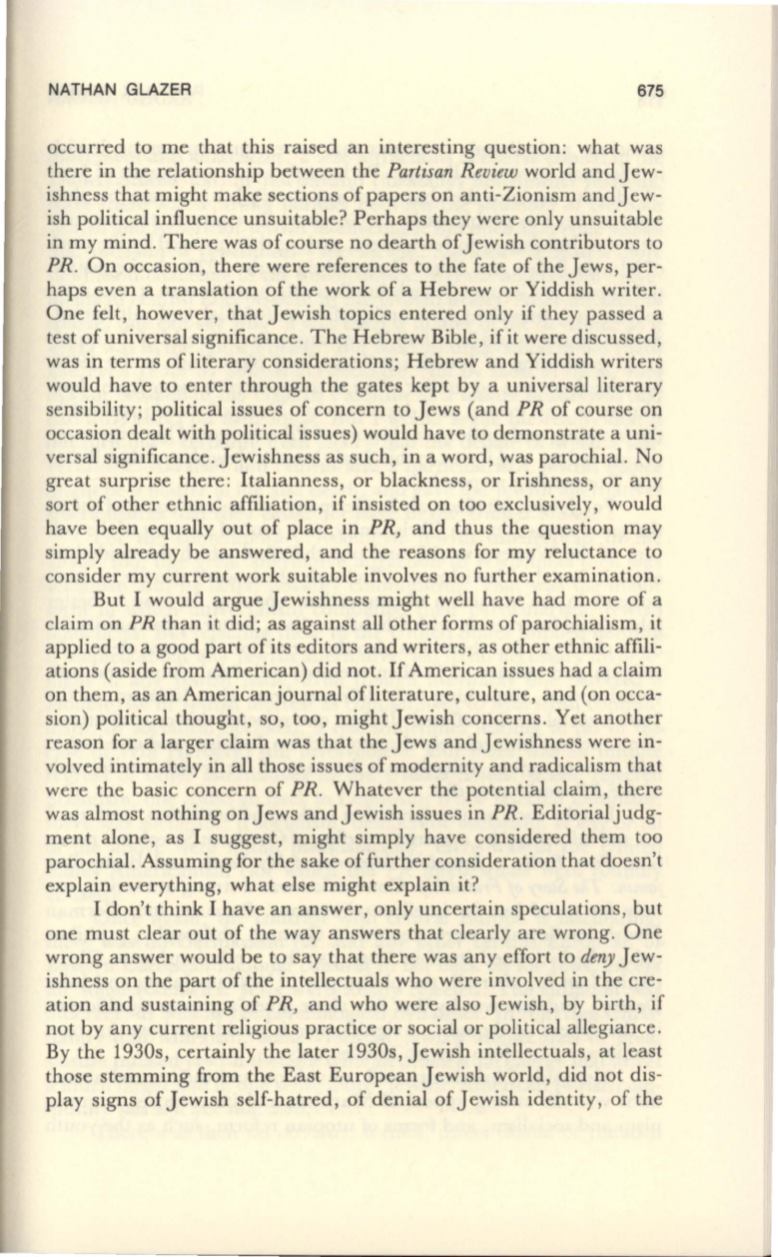
NATHAN GLAZER
675
occurred to me that this raised an interesting question: what was
there in the relationship between the
Partisan Review
world and Jew–
ishness that might make sections of papers on anti-Zionism and Jew–
ish political influence unsuitable? Perhaps they were only unsuitable
in my mind. There was of course no dearth ofJewish contributors to
PR.
On occasion, there were references to the fate of the Jews, per–
haps even a translation of the work of a Hebrew or Yiddish writer.
One felt, however, that Jewish topics entered only if they passed a
test of universal significance. The Hebrew Bible, if it were discussed,
was in terms of literary considerations; Hebrew and Yiddish writers
would have to enter through the gates kept by a universal literary
sensibility; political issues of concern to Jews (and
PR
of course on
occasion dealt with political issues) would have to demonstrate a uni–
versal significance. Jewishness as such, in a word, was parochial. No
great surprise there: Italianness, or blackness, or Irishness, or any
sort of other ethnic affiliation, if insisted on too exclusively, would
have been equally out of place in
PR,
and thus the question may
simply already be answered, and the reasons for my reluctance to
consider my current work suitable involves no further examination.
But I would argue J ewishness might well have had more of a
claim on
PR
than it did; as against all other forms of parochialism, it
applied to a good part of its editors and writers, as other ethnic affili–
ations (aside from American) did not.
If
American issues had a claim
on them, as an American journal of literature, culture, and (on occa–
sion) political thought, so, too, mightJewish concerns. Yet another
reason for a larger claim was that the Jews and J ewishness were in–
volved intimately in all those issues of modernity and radicalism that
were the basic concern of
PR.
Whatever the potential claim, there
was almost nothing on Jews and Jewish issues in
PR.
Editorial judg–
ment alone, as I suggest, might simply have considered them too
parochial. Assuming for the sake of further consideration that doesn't
explain everything, what else might explain it?
I don't think I have an answer, only uncertain speculations, but
one must clear out of the way answers that clearly are wrong. One
wrong answer would be to say that there was any effort to
deny
Jew–
ishness on the part of the intellectuals who were involved in the cre–
ation and sustaining of
PR,
and who were also Jewish, by birth, if
not by any current religious practice or social or political allegiance.
By the 1930s, certainly the later 1930s, Jewish intellectuals, at least
those stemming from the East European Jewish world, did not dis–
play signs of Jewish self-hatred, of denial of Jewish identity, of the


